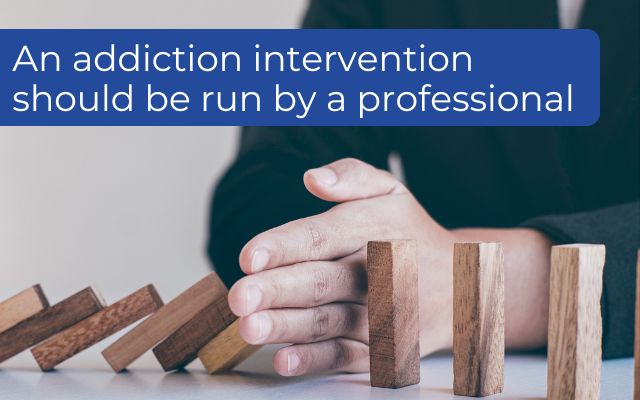An addiction intervention is a tightrope walk and getting the correct balance is essential which is why it should be run by an experienced professional, preferably a qualified interventionist.
Informal addiction interventions can do more harm than good and damage future attempts to intervene and help a loved one get into much-needed treatment.
A skilled, external and independent professional, called an interventionist, will help get the correct balance of evidence, leverage and emotional persuasion to get your loved on side and to agree to go to rehab today.
Tip: Ask your prospective interventionist if they are QUALIFIED as well as EXPERIENCED in conducting successful addiction interventions.
There are many specific roles played by a professional interventionist that can’t be undertaken by a layperson.

The interventionist will help get the leverage you need to get your loved one help.
The objective of a professionally organised intervention is to help the addicted person to gain a better awareness of the negative consequences, so they agree to go for treatment. The impact letters written by family members and other key people go a long way towards doing this. There is a format to these letters, your interventionist will guide you.
The interventionist will need a lot of information and detail about your loved one’s alcohol or drug addiction history in order to stage a successful intervention.
Most patients are leveraged into rehab and don’t come into treatment completely willingly. This pressure to go into treatment and to complete treatment enhances the outcome of treatment and the odds of treatment success. Most people think that patients need to be entirely willing or ready for treatment to work but this is not true.
An interventionist will help families and loved ones establish boundaries that will kick into place should the patient decline the offer of treatment. Without these boundaries from families, friends or employers, it is highly likely that the patient will not get the help they need and their life will continue to deteriorate.
Addiction is a progressive illness and it will only get worse without action. Those closest to the patient are best able to put consequences in place that will help nudge them into treatment.
A good interventionist will go beyond the intervention and educate families as well as link them to resources.
A professional interventionist will educate families about the nature of addiction and explain how it is a brain disease and not a choice or a moral failing.
The run-up to an intervention is also a good time for the family to learn about treatment and recovery as well as the responsibility they have in either helping their loved one recover or keeping them sick.
Treatment isn’t about treating one person – the patient. It’s more about a family realignment. The family needs to learn about the co-dependent role they’ve played and how they can either contribute to their loved one’s addiction, or their recovery.
In some cases, unless the family change their behaviour the patient will have no reason to change theirs. In these cases, the dysfunctional family system will continue to enable the addiction, despite the family’s best intentions. Recovery, for both families and their addicted loved one, is about behavioural change and a new lifestyle. It is not just a detox and some time away from the coal face of active addiction.
The interventionist will link families with 12-step fellowships and support groups for co-dependency that will help them better understand their loved one’s addiction. Families need to learn to change their stance in relation to their loved one. The family realignment part of treatment is crucial.
The interventionist will take responsibility for the full planning of the intervention.
This includes the ‘when’, ‘how’ and ‘who’.
The interventionist will arrange a number of planning meetings with everyone involved before the actual intervention. This could also include a trial run. The professional interventionist will also coach families on what to say and how to deal with potential obstacles.
They will set a day, time and location for the intervention. The intervention should happen early-on in the day at a point where the patient is the least-intoxicated.
The interventionist will also decide who should be involved in the intervention and exclude people with an axe to grind or those with substance abuse issues. Deciding who is going to form the central group for planning and execution is an important phase. This group will include family, close friends and possibly colleagues and bosses if more leverage is needed.
The interventionist will consult with the family about choosing an appropriate treatment centre and make preadmission arrangements so that the patient can go to treatment immediately after the intervention.
The interventionist will provide an objective point of view.
It is crucial that the entire intervention is directed by care and concern for the addicted person and not from a place of criticism, anger or historical disputes.
The interventionist will help families craft effective impact statements. Impact statements are written statements about how the person’s addiction has impacted their loved ones. They help the patient see that their addiction does not only impact them alone. Impact statements are designed to the heart of the patient. A good interventionist will do all he or she can to help patients get an emotional sense of how damaging their addiction is to both themselves and the people around them.
The interventionist will not only help families create boundaries, but also enforce them – especially at times where a patient is using emotional manipulation techniques to undermine the intervention.
Interventions are highly-charged emotional situations that need to be navigated by experienced professionals for the best chance of success. Good interventions can help patients get and stay in treatment – and save lives. Are you looking for a professional intervention service appropriate for your needs that guarantees a successful result? Contact us today!


